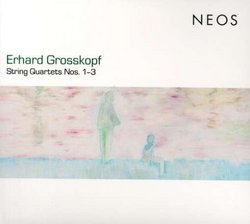| All Artists: Erhard Grosskopf Title: Erhard Grosskopf: String Quartets Nos. 1-3 Members Wishing: 0 Total Copies: 0 Label: Neos Original Release Date: 1/1/2007 Re-Release Date: 11/27/2007 Album Type: Import Genre: Classical Styles: Chamber Music, Historical Periods, Classical (c.1770-1830) Number of Discs: 1 SwapaCD Credits: 1 UPCs: 675754003531, 4260063610066 |
Search - Erhard Grosskopf :: Erhard Grosskopf: String Quartets Nos. 1-3
 | Erhard Grosskopf Erhard Grosskopf: String Quartets Nos. 1-3 Genre: Classical
|
Larger Image |
CD Details |
CD ReviewsThe Ardittis play Erhard Grosskopf Jeremy Glazier | Columbus, OH | 12/05/2007 (5 out of 5 stars) "It's wonderful to have access to a brand-new Arditti String Quartet release. This disc contains three string quartets by German composer Erhard Grosskopf (b. 1934). Little product information seems to be available online--I bought this disc on blind faith in the talent and the taste of the Ardittis and was not disappointed. The liner notes that accompany the disc are blissfully free of helpful information for the casual lister (if such a creature exists for this kind of music), so I hope the following will be of assistance to interested parties.
String Quartet No. 1 dates from 1983, and at 17.5 minutes, it is the shortest of the three. No. 2, roughly 20 minutes, is from 1990; and No. 3, dated 1997/98, is nearly 28 minutes long. The music is steeped in the sound world of the post-War avant-garde. If I had to venture some comparisons (always a flawed procedure, but sometimes helpful nonetheless), I would suggest influences of Scelsi and Ligeti, particularly in the earlier two works, and perhaps Berio and just a touch of Xenakis in the latest one--though Berio's Nottorno sounds almost melodic next to Grosskopf's No. 3, and Xenakis's chamber works tend to be much "busier" than these. Scelsi is perhaps the closest comparison. Each of the works on this disc contain passages of long, drawn-out threads of sound. The various "events" that disrupt, or interrupt, these threads are perhaps starker than in Scelsi, more violent, but they are beautiful. The careful listener will detect a sense of rhythm in these works, but it is not the regular, clock-driven rhythm of chronos but rather the organic rhythm of aion. In this aspect (perhaps alone), Grosskopf reminded me of Messiaen. (I realize I have not listed a single German in this list of comparisons, which is probably a mistake. Rihm might be the closest (his String Quartets V and VIII are from roughly the same period), but there are striking differences that make me hesistate to mention him. For one, his works seem more "event"-driven, even programmatic, compared to Grosskopf's, and some also contain extra-musical gestures. For his part, Grosskopf seems to emphasize the "pure," non-performative aspects of music.) The notes do contain a brief reflection by the composer, entitled "A House for Music," but this short essay does little to illuminate the works. ("The one-movement String Quartet No. 3 consists of seven processes of time and harmony, of which three together form a continuous variation of three, four, and five notes. The other processes have available notes from four fields of harmonics and are combined into two dual processes in the temporal domain....") Ultimately, the three pieces collected here stand on their own without commentary. " |

 Track Listings (3) - Disc #1
Track Listings (3) - Disc #1